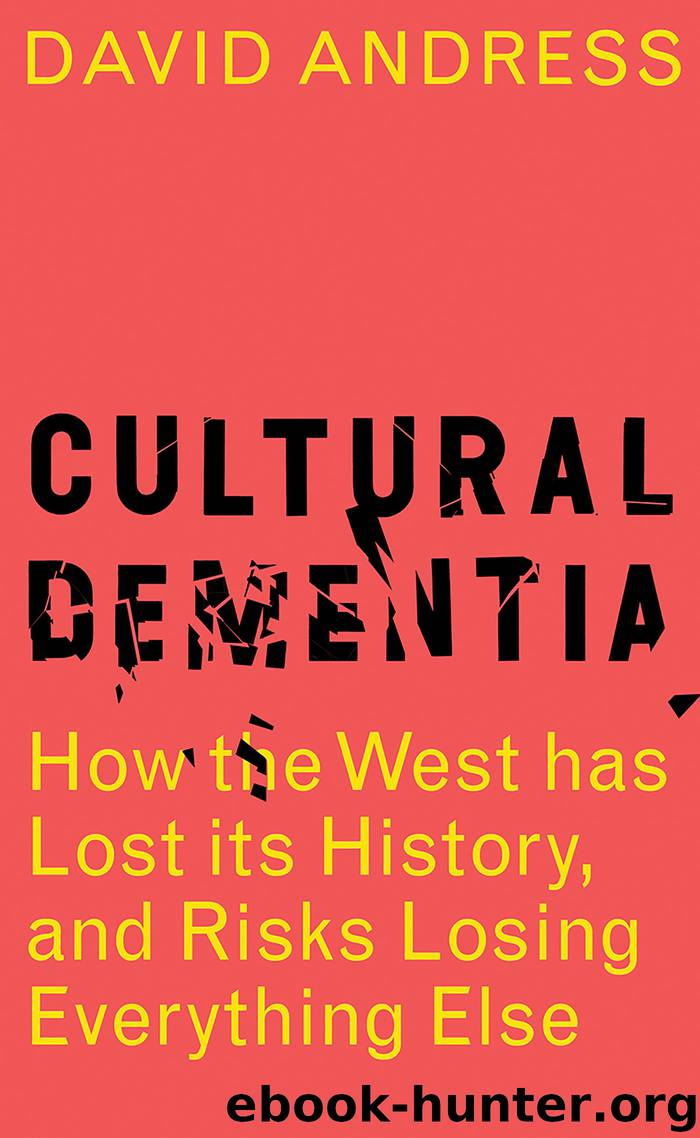Cultural Dementia by David Andress

Author:David Andress [Andress, David]
Language: eng
Format: epub
ISBN: 9781788540032
Publisher: Vearsa
6
What is the Past For?
Is there a route to salvation from our demented relationship with the past? In August 2017, the historian Christopher Kissane, a ‘BBC/AHRC New Generation Thinker’, boldly proposed that ‘Historical research and analysis is a seditious rejection of those who seek to control the past in order to shape the future’, and historians should stand up for its public role as such:
History should not appear only on screen or in print for antiquarian appeal or provocation, but to inform wider debates. Like economics and science, historical expertise has a place in the analysis of current affairs, and indeed in the assessment of politics and policy. Historians must also take it upon ourselves to increase our engagement with broader audiences, spreading awareness of the content, diversity and importance of our work. This change must extend, too, to the education of the next generation: in schools, history should sit alongside languages, science and maths as core subjects for every child.1
The bitter irony of such a list is that, in fact, many of these good things already happen. History is, and has always been, one of the core subjects of the English National Curriculum. Since 2002, the dedicated historians who run the History & Policy group have systematically engaged policy makers in the UK with historical evidence.2 It is true that the ‘stars’ of television history broadcasting can be counted on one’s fingers, and some of them are not even professional historians, but the very competition Kissane had won exists to address that problem.
The sticking point is that this proposal hinges on the idea of a simple deficit, persisting despite decades of educational effort. The young British poet and rapper Akala made a very similar point in an impassioned speech in May 2017, exploring ‘the battle of Britishness in the age of Brexit’ and concluding: ‘the answer is education. Confrontation with difficult histories and developing an understanding of how those histories have shaped the present.’3 In both these well-intentioned interventions, the problem is defined as a lack of enough good historical work out there, telling people how it really was, overcoming ignorance with facts. But there are entire bookshops’ worth of good historical work, whole departments of bold young historians (and some grizzled old veterans) who have been telling their students, and anyone else who would listen, how it really was for at least a generation. The problem remains what to do when people don’t want to listen, or learn.
Historians constantly address the value of their studies for wider society. Ludmilla Jordanova’s History in Practice, in its first edition, ends with a ‘Postscript: History’s future: a personal statement’, which despite its proclaimed individuality could stand for many such contributions: differences in practice are good, as long as there are underlying standards of scrupulous research; passionate commitment can be balanced with probing detachment. ‘In both their teaching and their research, historians should, responsibly, unsettle their audiences, provoke them to think harder and deeper about the human condition.’4 In the following pages
Download
This site does not store any files on its server. We only index and link to content provided by other sites. Please contact the content providers to delete copyright contents if any and email us, we'll remove relevant links or contents immediately.
The Secret History by Donna Tartt(19088)
The Social Justice Warrior Handbook by Lisa De Pasquale(12190)
Thirteen Reasons Why by Jay Asher(8910)
This Is How You Lose Her by Junot Diaz(6887)
Weapons of Math Destruction by Cathy O'Neil(6280)
Zero to One by Peter Thiel(5802)
Beartown by Fredrik Backman(5754)
The Myth of the Strong Leader by Archie Brown(5507)
The Fire Next Time by James Baldwin(5446)
How Democracies Die by Steven Levitsky & Daniel Ziblatt(5219)
Promise Me, Dad by Joe Biden(5153)
Stone's Rules by Roger Stone(5088)
A Higher Loyalty: Truth, Lies, and Leadership by James Comey(4964)
100 Deadly Skills by Clint Emerson(4925)
Rise and Kill First by Ronen Bergman(4789)
Secrecy World by Jake Bernstein(4753)
The David Icke Guide to the Global Conspiracy (and how to end it) by David Icke(4720)
The Farm by Tom Rob Smith(4512)
The Doomsday Machine by Daniel Ellsberg(4490)
